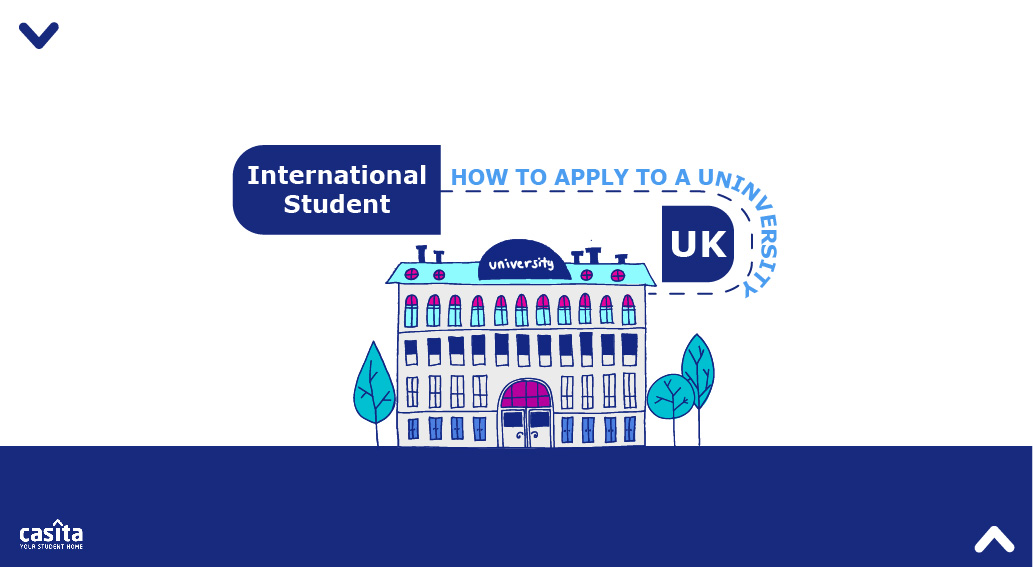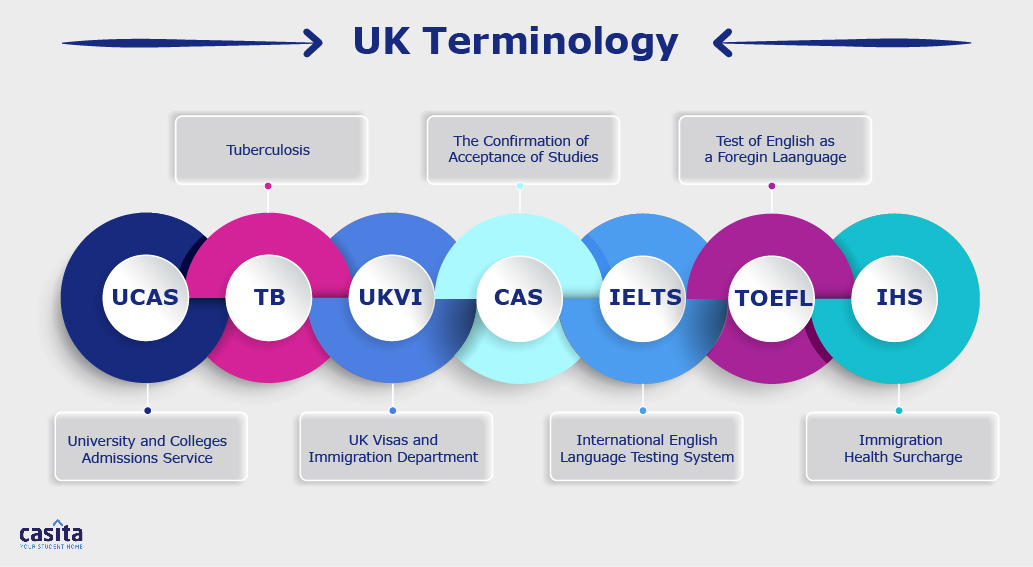How to Apply to a UK University as an International Student
Tips and Advice
University Life
09 August, 2023
|
7 mins read
By Hagar Samir
Share

How to Apply to a UK University as an International Student
Tips and Advice
University Life
09 August, 2023
|
7 mins read

By Hagar Samir
Share
Studying abroad is something almost every student wants! You get to explore a new country, meet new people, try new things, and go on many different adventures! So, in order to actually travel, there are some things you need to decide first. First, you should decide whether you’re going to study in the UK, the US, or Australia.
If you’ve decided to study in the United Kingdom and don’t know how to apply to a UK university, then don’t worry; we’ve got your back! The United Kingdom is known for many things: sports, literature, golf, and even cricket! In addition, it is a fact that the educational system there is one of the best, if not the best!
This is why the number of international students in the United Kingdom is really high, and it is the most desired place to go. The UK has a wide range of universities that offer high-quality education by respectable professors, adding to their reputation as the greatest universities in the world!
We understand how overwhelming the process of applying can get. That’s why we want to help you and give you all the information you need to have a smooth process! Here is an overview of how to apply to a UK university: from the admission process to the key requirements, you will have a handle on your entire situation and be able to make a decision with ease.
UK Terminology
Before teaching you how to apply to a UK university, there are a few terms that you have to be aware of beforehand. Knowing these terms will help you have a better understanding of the system and a smoother process!

UCAS
An abbreviation for ‘University and Colleges Admissions Service’, UCAS is the organisation operating the British universities’ application process.
UCAS Tariff Points
This is the points system that evaluates UK university applicants. The common grading system (in the UK: A, B, and C) is converted into points to make it easier for course providers to compare and determine the perfect fit for each student!
TB Test - TB Test Centre
TB is an abbreviation for Tuberculosis, a disease caused by a bacterial infection in the lungs. This test is mandatory for certain countries before applying to the university; check if yours is on the list in order to prevent an unnecessary delay in the process.
UKVI
UKVI stands for ‘UK Visas and Immigration Department’. This is the department that will process all things related to your student visa in the UK (if applicable).
CAS Form
The Confirmation of Acceptance of Studies (CAS) letter is the one you will receive from your university once you have been accepted and is very important when applying for your visa as it contains all the relevant information about your university and course.
IELTS - TOEFL
IELTS stands for ‘International English Language Testing System’, and TOEFL stands for ‘Test of English as a Foreign Language’. Both are certifications to validate your proficiency level in the English language, and many universities ask for one or another of them or a UKVI test.
IHS
IHS Stands for Immigration Health Surcharge, which is a fee you will need to pay in order to receive free healthcare during your studies in the UK. The cost of this is around £150 (US$210) and will give you access to a world-class healthcare system. The fee should be paid online through the UK government's official website. There are some requirements in order to be eligible for free healthcare in the UK; make sure to check those out first!

Why Choose the United Kingdom?
So, why especially the UK rather than any other country? Choosing a university in the United Kingdom is one of the best decisions you’ll ever make for several reasons. We’ve gathered a list of reasons why applying to a UK university is a great idea!

High-quality Education
From undergraduate to postgraduate, research, and PhD, UK universities provide their students with world-class education at all levels. The UK is known for being home to some of the most prestigious educational institutions globally, such as the University of Oxford, the University of Cambridge, and Imperial College London.
Accommodation
Not only does the United Kingdom have the best universities, but it also has the best accommodation options for students! These options all offer a wide variety of rooms for students to comfortably choose from according to their needs, budgets, and preferences. They’re also really close to their universities. All units also provide students with amenities that facilitate their stay and make it better. Some of the best accommodation options include iQ Shoreditch, Staniforth House Unite, and Cedar House Unite.

Lifestyle
You’ll enjoy not only a high-quality education in the UK but also a lifestyle of welfare and prosperity. Public facilities like solid transportation links and efficient healthcare systems are easily accessible. The NHS declared the UK healthcare system the most efficient healthcare system in the world, so you’ll be in good hands!
Career Opportunities and Personal Skills
Studying at a UK university will open up so many doors, as it holds a prestigious status when appearing on a resume. Business owners and corporate CEOs find UK university graduates quite a catch, and they are always looked highly upon!
Culture and Diversity
More than 500,000 international students enrol in a UK university each year, making it easy to blend in and mingle with like-minded groups of people. A wide range of religions, ethnicities, and cultural backgrounds are represented in the UK, making adapting to differences easy!
How to Apply to a UK University
Now that you know everything about universities in the UK, it’s time to know how to apply to a UK university! We’ve gathered a list of things you need to do in order to help you through the process of applying.
First Step: Prepare the Required Documents
Whether you want to know how to apply to a UK university or a university in another country, like the US, you’ll need to prepare the following papers ahead of time and keep a digital copy of them to send and upload when required.
English Language Proficiency Certificate (IELTS Academic - TOEFL iBT - PTE Academic - Cambridge English exam).
Recommendation Letter.
Personal Statement.
Bank Statement - Financial proof you can fund your studies.
Original Birth Certificate.
Current Passport - Original and Copy.
National Identification Card - Copy.
Academic Certificates.
Academic Transcripts - Translated into English.
Tuberculosis Screening Certificate - from UKVI-approved TB Test Centre (if applicable)

Second Step: UCAS Application: How to Apply for the UCAS?
The second step in knowing how to apply to a UK university is the UCAS application. You must keep in mind that most of the UK universities, if not all of them, will only accept your application through the UCAS system. Therefore, the steps will be as follows:
1. Enter the UCAS official website and read about the exact deadline for applications and the paperwork required.
2. Register for an account on the UCAS website. Further information will be required after registration, like special needs requirements, residential status, sponsorship options, and criminal convictions.
3. Fill out these details, then add your subject of interest (you can choose up to three subjects) and your placement year preferences (whether you want to be a practitioner of a trade or profession).
4. Fill out your entire educational history with all the necessary documents from secondary education onward.
5. Add employment details if you have undertaken any full-time or part-time work or any other voluntary work too.
6. Choose/apply for university programmes:
You can apply for up to five programmes at the same university or at different ones. You can take your time searching and exploring your options, as you can add other programmes to your application later on if you feel a bit confused and overwhelmed.
7. Write Your Personal Statement:
Personal statements are a vital part of your application and the most time-consuming aspect. Generally speaking, personal statements should showcase the skills you have and how they are compatible with the course requirements. Don’t feel the need to mention every single detail in your life; just mention what is appropriate and relevant to your application. For a more in-depth step-by-step guide on this, you can check out our blog: Tips and Tricks for a Successful Personal Statement.
8. Submit a Recommendation letter:
Don’t forget to get a recommendation letter from a teacher, advisor, or any other professional who knows you well academically. This step is a must for your application to be accepted; don’t underestimate it.
9. Pay the UCAS application fee online through the official website:
You’ll need to enter your credit/debit card number. The price differs according to the choices you make regarding the programme you want to enrol in. The fee is £20 for a single choice and £26 for more than one and five choices, so it’s worth it to apply for several courses or universities at once.
Third Step: Interviewing and Additional Documentation
Many top universities ask for an interview as a final step in the application process. Due to COVID-19, most interviews are now virtual, of course; however, your preparation should not change. You must have a guide on how to prepare for a university admission interview so you don’t panic or mess it up! Also, we understand the stress and anxiety that come with interviews, which is completely understandable; practice carefully beforehand to prevent any problems you don’t want!
-min.jpg)
Fourth Step: University Offer—Are You Accepted?
After passing the interview successfully, you are now waiting for an acceptance letter (an offer), and you might get one of these two:
1- Conditional Offer: This indicates you haven't met all the requirements yet and additional documentation is needed before you are accepted.
2- Unconditional Offer: This indicates you have met all the requirements and your place is now confirmed! All that’s left now is for you to simply accept or defer the offer. Congratulations, and don’t forget to read some tips to survive your first year at university.
After finishing all of these steps and getting accepted into your dream university, you’re going to have to start planning your student accommodation in the UK, your flights, and your transportation! Remember to enjoy your college years and visit all the places you want to; it’s a great opportunity! Best of luck!
Tips and Advice
University Life
By Hagar Samir
Share
Tips and Advice
University Life
By Hagar Samir
Share


